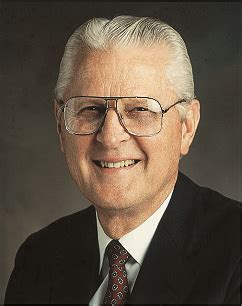A Quote by Dalai Lama
We can't be useful to ourselves unless we're useful to others .... Anyone concerned only by his own well-being will suffer eventually. Anyone concerned with the well-being of others takes care of himself without even thinking about it. Even if we decide to remain selfish. let us be intelligently selfish - let us help others.
Related Quotes
The dictionary describes a selfish person as one who is 'concerned excessively or exclusively with oneself: seeking pleasure or well-being without regard for others.' May we add, a selfish person is often one who refers to 'I,' 'me,' and 'mine' rather than to 'we,' 'ours,' 'yours,' or 'theirs.' This person is anxious to be in the limelight, to be on center stage in life's little dramas. He or she may be a poor listener, or a conversation monopolizer. Selfishness is the great unknown sin. No selfish person ever thought himself to be selfish.
According
to my own experience, the highest level of inner calm comes from the
development of love and compassion. The more concerned we are with the
happiness of others, the more we increase our own well-being.
Friendliness and warmth towards others allow us to relax and help us to
dispel any sense of fear or insecurity so we can overcome whatever
obstacles we face.
Being concerned about other people is especially relevant in today's world. If we consider the complex inter-connected ness of our modern lives, how we depend on others and others depend on us, our outlook will change. We’ll begin to see 'others' not as somehow distant from us, but as people we are in touch with, people close to us; we will no longer feel indifferent to them.
Emotional dependence is the opposite of emotional strength. It means needing to have others to survive, wanting others to "do it for us," and depending on others to give us our self-image, make our decisions, and take care of us financially. When we are emotionally dependent, we look to others for our happiness, our concept of "self," and our emotional well-being. Such vulnerability necessitates a search for and dependence on outer support for a sense of our own worth.
A man preacheth that sermon only well unto others which preacheth itself in his own soul. And he that doth not feed on and thrive in the digestion of the food which he provides for others will scarce make it savoury unto them; yea, he knows not but the food he hath provided may be poison, unless he have really tasted of it himself. If the word do not dwell with power in us, it will not pass with power from us.
When therefore we are hindered, or disturbed, or grieved, let us never attribute it to others, but to ourselves; that is, to our own principles. An uninstructed person will lay the fault of his own bad condition upon others. Someone just starting instruction will lay the fault on himself. Some who is perfectly instructed will place blame neither on others nor on himself.
Some might say that looking inside of ourselves for spiritual truths is egocentric and selfish, and that egolessness and selflessness lie in working for others in the world. But until we find our inner truth, our work in the world will always revolve around our 'selves'. As long as we think about the world in terms of 'self' and 'others', our actions will be selfish. Our 'self' follows us wherever we go, so positive results will be limited.
One of the fundamental demonstrations of our natural instinct to Bond with each other is a will to give. Rather than domination, our most basic urge is to reach out to another human being, even at a cost to ourselves. Giving to others-the urge to empathize, to be compassionate, and to help others altruistically-is not the exception to the rule, but our natural state of being. Our impulse to connect with each other has developed an automatic desire to do for others, even at personal cost. Altruism comes naturally to us. It is selfishness that is culturally conditioned and a sign of pathology.
We would willingly have others perfect, and yet we amend not our own faults. We would have others severely corrected and will not be corrected ourselves. The large liberty of others displeases us, and yet we will not have our own desires denied us. We will have others kept under by strict laws, but in no sort will ourselves be restrained. And thus it appears how seldom we weigh our neighbor in the same balance with ourselves.






































